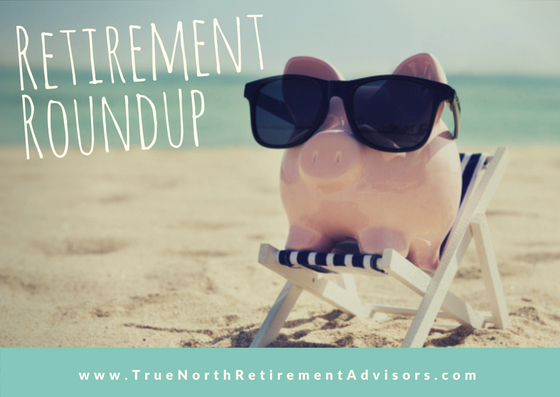
Articles and ideas to help you live a fulfilled and financially secure retirement!
In this month’s Retirement Roundup, we’ve curated our favorite articles from around the web to help you live a fulfilled and financially secure retirement!
We start off with an article about why you should stop celebrating your tax refund and start paying closer attention to your Form W-4 to minimize the 0% loan that you make to the government in exchange for that refund in the spring.
Then, we continue with the subject of taxes to discuss how you can stretch your retirement with a powerful tax-saving strategy involving the Roth IRA.
Keeping with the topic of taxes, we discuss how some quirks in the Tax Cuts and Jobs Act just made traditional 401(k) contributions a lot less attractive for business owners, and what you may want to consider instead.
Next, we switch gears and discuss why the idea of work-life balance may be defeating and too limiting in our desire to live fulfilled lives.
Lastly, we look at how much you really need to retire, and why arbitrary targets for your retirement nest egg, like $5 million or $10 million, is counter-productive and discouraging. Instead of focusing on a generic number, we discuss which factors most influence your chance of not running out of money in retirement, and how you can use those factors to decide how much is enough…for you.
Enjoy this month’s installment of the Retirement Roundup!
Stop Celebrating Your Tax Refund – It’s a 0% Loan to the Government
(Brett Arends | MarketWatch)
I always find it interesting when I talk with clients, friends, neighbors, and family about their tax refund. Everyone is so excited about getting a tax refund, but few people realize that their tax refund is just that: a refund. The government held onto your money all year, and then pays you back with 0% interest after you file your taxes.
In addition, with all the tax law changes from the Tax Cuts and Jobs Act, it appears that refunds are even more likely this year, since many people have not adjusted their W-4 to account for lower taxes and a larger standard deduction.
According to this Op-Ed in MarketWatch, “if you’re one of the tens of millions in line for a big tax refund check this season, there’s one other step you should think about taking before you spend a dime: Review Form W-4 filed with payroll at work.”
In an ideal world, you would not receive a refund, nor owe additional money to Uncle Sam, but if you receive a sizable refund this year, it should be a big, waving, red flag to adjust your withholding on your paycheck.
To have the courage to get off the sugar-rush of the springtime tax refund, it’s vitally important that you adjust your mindset about your refund. Too many people rely on their refund to pad their savings, pay off debt, buy a big-screen TV, or take that vacation they’ve been dreaming of for the last 6 months.
Instead, use the additional funds in your paycheck to plan and save in advance for those big purchases, so you don’t have to rely on a refund, at 0% interest.
The bottom line is: If you receive a refund this year, consider adjusting your withholding from your paycheck to reduce your refund and increase your take-home pay.
Stretch Your Retirement with this Tax-Saving Strategy
(Gail MarksJarvis | Reuters)
A retiree profiled in Reuters, Bill Reichenstein (age 66), retired a few months ago. He plans to convert money from his Traditional IRA and 401k accounts to a Roth each year between now and when he turns 70 years old.
Reichenstein will pay income tax on the amount that he converts to a Roth, but that money will grow tax-free once it’s inside the Roth. According to the article: “Reichenstein figured out that the conversions will give him more than a couple hundred thousand dollars more than he would have had for retirement because of those tax savings.”
The strategy avoids taxes on RMDs on the amount converted, since Roth IRAs do not have RMD requirements, making this a powerful tax-saving strategy if you can handle the tax bite on those conversions.
Rather than doing one big conversion into a Roth which can be quite costly, converting over a number of years, like Reichenstein plans to do, can help to spread out the taxes on converted amounts over a period of several years.
The ideal window for Roth conversions is when you are retired, but before you start social security. Your income will likely be lower, which could reduce the taxes owed on amounts converted to a Roth.
This strategy requires that you a) understand your tax situation to determine if gradual Roth conversions make sense for you, and b) plan ahead to maximize the number of years to make Roth conversions.
Here at True North, we can help you determine if a Roth conversion strategy makes sense for you. Contact us at 503-387-6869 or email ashleym@truenorthra.com if you would like some help running the numbers on a multi-year Roth conversion strategy.
How The New QBI Deduction-Reduction Ruins The Value Of Pre-Tax Retirement Plans For Small Business Owners
(Jeffrey Levine | Nerd’s Eye View)
Retirement plan contributions (i.e. 401(k) & SEP IRA contributions) may have just become far less attractive for business owners who fall under the newly created IRC Section 199A.
Here’s how this new section of the tax code affects business owners: “when a S corporation makes an employer contribution to an employer-sponsored retirement plan, that contribution reduces corporate profits. Thus, there is less profit on which the 199A deduction can potentially apply.”
The result is that business owners may only receive a partial deduction on contributions to retirement plans, not the full deduction that was received in the past.
Before you throw the baby out with the bathwater and stop making 401(k) or SEP IRA contributions altogether, it’s important to realize that the likely result of this tax law change is that Roth 401k contributions will now become more attractive compared to Traditional 401(k) contributions.
While this article is long and technical, it’s a worthwhile read if you are a business owner making contributions to an employer-sponsored retirement plan.
It’s also a good idea to use this opportunity to discuss your employer-sponsored plan with your tax advisor to see if Section 199A will impact your ability to fully deduct your retirement plan contributions, and if some type of restructuring of your contributions (through Roth contributions) makes sense.
We Need to Stop Striving For Work-Life Balance. Here’s Why.
(Tracy Brower | Fast Company)
When asked recently if the concept of work-life balance was dead, Tracy Brower replied: “I hope so!” She is a sociologist focused on work, workers, and the workplace, and in this article, she discusses why the concept of work-life balance can be problematic.
She argues that the concept of work-life balance is a problem, because it’s too limiting. She explains: “everyone deserves more than just balance. Balance is a limiting concept, and if we set the bar too low, we won’t demand enough of ourselves, our leaders, and our companies.” She continues: “There are seasons of life where you’ll have less time for yourself and will devote more to school or family or work. This is part of the normal ebb and flow of life. When you think big and expect that you can have a positive experience with all that work and life have to offer, you’ll be more likely to make that happen.”
Instead, she talks about how we should strive for work-life fulfillment instead, since the word balance suggests that things are “hanging in the balance” or could quickly get “off balance”. Since we are unlikely to be in balance consistently throughout life, seeking fulfillment in our current season of life, where we may be wildly out of balance in one area or another is more productive.
Matthew Kelly talks about this same concept in his book Off Balance: Getting Beyond the Work-Life Balance Myth to Personal and Professional Satisfaction. It’s a book that I first read in 2016, and I have revisited many times. He outlines a process by which you can achieve satisfaction and fulfillment by focusing your time, efforts, and goals on what’s most important to you, rather than spreading yourself too thin by striving for balance. It’s a book that I highly recommend for anyone who struggles with prioritizing what’s most important – an important exercise for anyone to undertake, but most especially in the years leading up to retirement!
How Much Do You Really Need to Retire?
(Scott Van Voorhis | TheStreet)
How much to you really need to retire? Some financial gurus and TV commentators throw around arbitrary numbers, like $5 million or $10 million.
As you might guess, there is no one-size-fits-all dollar figure for a comfortable retirement, since lifestyle and spending needs differ drastically among each of us. Many Americans would be satisfied with $50,000 per year of income in retirement, while I know others who cannot imagine living on less than $250,000 per year in retirement.
The key is understanding how much income per year is required to fund the lifestyle you desire in retirement. This income figure should address your regular spending needs, healthcare costs, travel, hobbies, and paying for the “big stuff” like a new roof or a new car.
If you can build an investment portfolio that can fund your lifestyle and income needs in retirement with enough cushion for emergencies, you’ll be able to figure out into how much you’ll need to save and when you can retire to fully fund your lifestyle in retirement.
It’s also important to account for social security income, and options you might have to shore up your retirement savings if things don’t go as planned. This could include a reverse mortgage or selling your home later in life if your retirement plan “breaks”.
The best time to determine how much you need to retire is at least 2 years before retirement, but ideally 5+ years out, which will give you enough time to course-correct by saving more or considering a later retirement date.
THANKS FOR READING!
Did you enjoy reading this? Do you want more content like this delivered to you each week?
>>CLICK HERE TO SUBSCRIBE TO OUR NEWSLETTER <<
Related Posts:
-
BUSINESS EXIT STRATEGY: HOW TO CALCULATE VALUATION
-
BUSINESS EXIT STRATEGY: ESTABLISH YOUR DEPARTURE DATE & EXIT GOALS
-
BUSINESS EXIT STRATEGY: HOW MUCH DO I NEED TO RETIRE?
-
BUSINESS EXIT STRATEGY: HOW TO CREATE YOUR BUSINESS EXIT PLAN
Disclosure:
The views outlined in this newsletter are those of True North Retirement Advisors (TNRA) and should not be construed as individualized or personalized investment advice or tax advice. TNRA are not licensed tax consultants, please contact your CPA for advice on your specific tax situation. Any economic and/or performance information cited is historical and not indicative of future results. Economic forecasts set forth may not develop as predicted.
Different types of investments involve varying degrees of risk, and there can be no assurance that the future performance of any specific investment, investment strategy, or product made reference to directly or indirectly, will be profitable, equal any corresponding indicated historical performance level(s), or be suitable for a given client or portfolio.
Investing in stocks includes numerous specific risks including the fluctuation of dividend, loss of entire principal and potential illiquidity of the investment in a declining market. Bonds are subject to market and interest rate risk if sold prior to maturity. Bond and bond mutual fund values and yields will decline as interest rates rise and bonds are subject to availability and change in price.
Any questions regarding the applicability of any specific issue discussed above should be addressed with TNRA. All information, including that used to compile charts and/or tables, is obtained from sources believed to be reliable, but TNRA has not verified its accuracy and does not guarantee its reliability.
Moreover, you should not assume that any discussion or information contained in the newsletter serves as the receipt of, or as a substitute for, personalized investment advice from TNRA or from any other investment professional. To the extent that you have any questions regarding the applicability of any specific issue discussed above to your individual situation, you are encouraged to consult with TNRA or the professional advisor of your choosing. All information, including that used to compile charts, is obtained from sources believed to be reliable, but TNRA has not verified its accuracy and does not guarantee its reliability.



